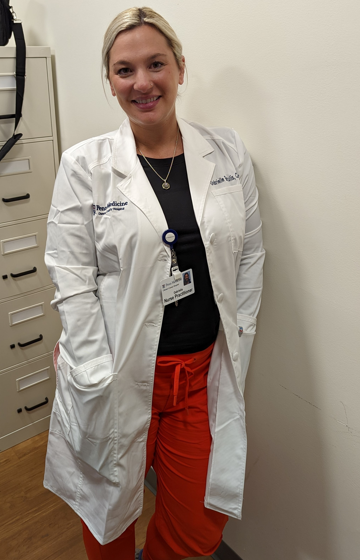Getting the right care in the right place is what every person wants and needs when they are experiencing a health problem — and that’s equally true whether it’s a question of physical health, psychiatric health, or both. At Penn Medicine Chester County Hospital (CCH), a new behavioral health team established in the last few years is rising to meet a surging need among patients.
Before the formation of a Behavioral Health service line program at CCH in February 2020, social workers were the foundation of the hospital’s behavioral health care, says Kyle Finucane, MSW, who was appointed director of CCH’s new Behavioral Health service line program and has worked in the CCH Emergency Department as a social worker since 2014. Social workers throughout the hospital were responsible for assessing patients and collaborating with their medical providers to make care recommendations. Based on those recommendations, the social workers would connect patients to the appropriate, available inpatient and outpatient resources.
Today, the CCH Behavioral Health team comprises twelve full-time and four part-time staff members, including eleven social workers and four treating behavioral health clinicians. These include three nurse practitioners and Samantha Dawson, a licensed behavioral health counselor, who was hired to provide brief therapeutic interventions to patients experiencing a behavioral health crisis.
Kim Joffe, CRNP, PMHNP, the longest-serving psychiatric nurse practitioner, joined the CCH Behavioral Health team with passion and inspiration from her own life. She left a career in finance in her late thirties to return to school and ultimately become a psychiatric nurse practitioner. She was inspired by a family member’s struggles with their mental health and the disparities she observed working in emergency departments across Philadelphia.
“I know what it’s like to be on the other side, and I didn’t like what I saw,” Joffe says. “I knew we could do better.”
Joffe previously worked as a nurse with the Emergency Department at the Hospital of the University of Pennsylvania before she transferred to the Emergency Department at CCH. Shortly after, she transitioned to her current role in February 2020. She credits President and CEO Michael Duncan, Chief Medical Officer Karen Pinsky, MD, and other senior leaders at CCH for advocating for the needs of patients in behavioral health crisis and providing the resources to meet those needs — of which the Behavioral Health service line is one key part.
Having the dedicated psychiatric staff now allows for improved quality of care, which is vital at CCH because the need for behavioral health care in Chester County accelerated faster than anyone anticipated — fueled by the pandemic and local hospital closures.
In addition to treating patients experiencing behavioral health crises, the team provides care, treatment, and resources for patients throughout the hospital with comorbid psychiatric and medical conditions. The team supports patients with psychiatric illnesses and crises ranging from deep depression with suicidal ideation and schizophrenia with psychosis to delirium and substance use disorders.

During a patient’s hospital stay, which varies in length depending on their individual stability and psychiatric care needs, they might receive one or more of a variety of types of behavioral health care and support. These range from medication management and talk therapy to more security and safety-oriented services like enhanced safety rooms for patients who may be at risk of self-harm. During their stay, the Behavioral Health team, which includes social workers, nurse practitioners, and clinicians, collaborates to treat the individual patient and coordinate a safe outpatient plan. If extended inpatient care is needed, the team works to accommodate the patient or place them in an appropriate inpatient psychiatric facility.
Now, a greater portion of patients have been able to be safely discharged, rather than having to transfer them to an inpatient psychiatric facility, Finucane says. He credits this to CCH’s onsite behavioral health support.
“The silver lining to having patients here for so long is that we get to witness their progress,” Joffe says. “And when, every once in a while, someone says, ‘Thank you for helping me get better,” it’s priceless. That’s why I went into psychiatry. I love doing what I do.”
Joffe says there are several subtle ways the team is making a difference in the lives of their patients, including simply enabling them to be seen and heard in a safe space.
“With a dedicated program designed to better meet the needs of this population,” Finucane says, “it lends itself to a model of care that is ‘trauma-informed,’ meaning it provides a level of care that not only meets the needs of the patient but is also caring and compassionate and not adding to the crisis.”